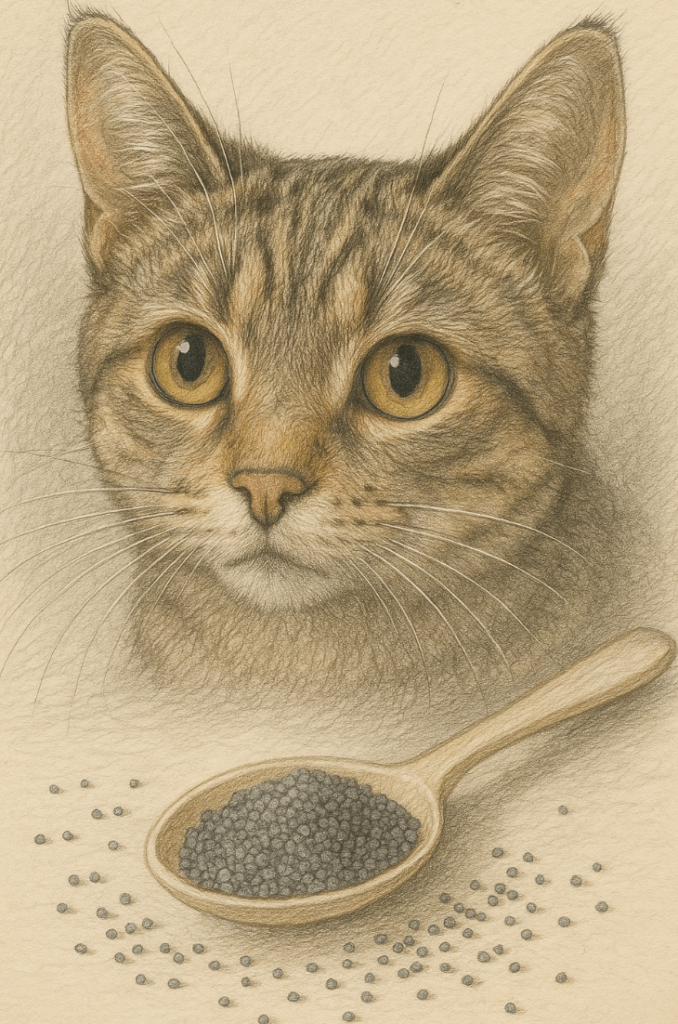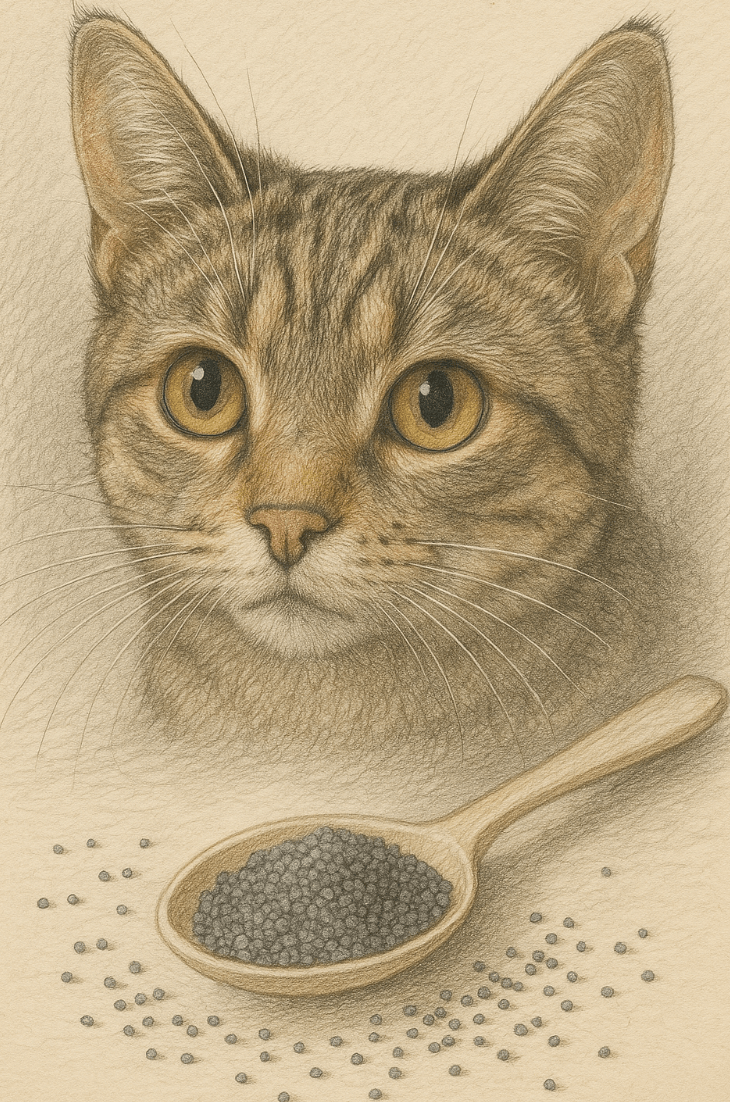Can Cats Eat Poppy Seeds?
Poppy seeds are a common ingredient in many human foods, from baked goods to salads. But what about our feline friends? Can cats eat poppy seeds safely, or should they be avoided altogether? As responsible pet owners, it’s important to understand how certain foods affect our cats’ health. While cats are obligate carnivores and don’t require plant-based foods in their diet, curiosity can sometimes lead them to nibble on things they shouldn’t. In this blog post, we’ll explore the potential risks and benefits of poppy seeds for cats, as well as safer alternatives to keep your furry friend happy and healthy.
Potential Risks of Feeding Poppy Seeds to Cats
While poppy seeds might seem harmless, they can pose serious risks to cats if consumed in significant quantities. Here are some potential dangers to be aware of:
Toxicity from Opium Alkaloids:
Poppy seeds contain trace amounts of opium alkaloids, which can cause sedation, confusion, or respiratory issues in cats.Digestive Upset:
Cats may experience vomiting, diarrhea, or stomach pain after ingesting poppy seeds due to their sensitive digestive systems.Behavioral Changes:
Even small amounts of poppy seeds can lead to lethargy, disorientation, or unusual behavior in cats.Risk of Overdose:
Larger quantities of poppy seeds can result in opioid-like effects, including slowed breathing or loss of consciousness.Allergic Reactions:
Some cats may have allergic reactions to poppy seeds, such as itching, swelling, or difficulty breathing.
These risks highlight why caution is essential when it comes to feeding poppy seeds—or any unfamiliar food—to your cat. Always prioritize their safety over curiosity.
Signs Your Cat May Have Eaten Poppy Seeds
If you suspect your cat has consumed poppy seeds, watch for these warning signs that indicate they may be experiencing adverse effects.
Lethargy and Weakness:
Cats exposed to poppy seeds may appear unusually tired or unresponsive.Difficulty Breathing:
Respiratory distress is a serious symptom that requires immediate veterinary attention.Vomiting or Diarrhea:
Gastrointestinal upset is a common reaction to ingesting non-toxic but inappropriate foods.Confusion or Disorientation:
The psychoactive compounds in poppy seeds can cause neurological symptoms like stumbling or staring blankly.Loss of Appetite:
Cats who feel unwell may refuse food or water, signaling a need for medical evaluation.
Recognizing these signs early allows you to seek veterinary care promptly, preventing further complications.
Check this guide 👉Can Cats Eat Pomegranate? Best 7 Expert Tips!
Check this guide 👉Can Cats Eat Soy Sauce? Best 7 Expert Tips!
Check this guide 👉Can Cats Eat Grits? Best 7 Expert Tips!

Safe Alternatives to Poppy Seeds | Risks of Unsafe Food Choices |
|---|---|
Cooked plain chicken (unseasoned) | Foods containing toxic compounds |
Small pieces of cooked fish (boneless) | High-fat or processed snacks |
Cat-safe fruits like blueberries | Foods with artificial sweeteners |
Plain rice or boiled vegetables | Spicy or heavily seasoned dishes |
Commercial cat treats designed for felines | Human foods with choking hazards |
How to Prevent Your Cat from Eating Harmful Foods
Prevention is key to ensuring your cat stays safe from potentially harmful foods like poppy seeds. Follow these tips to minimize risks around your home.
Store Food Securely:
Keep all human foods, especially those containing poppy seeds or other toxins, out of reach of curious paws.Supervise During Meal Prep:
Be mindful of spills or dropped ingredients while cooking, as cats may quickly ingest something dangerous.Educate Family Members:
Ensure everyone in your household understands which foods are unsafe for cats to prevent accidental sharing.Provide Safe Treats Instead:
Offer cat-approved treats or snacks to satisfy their cravings without compromising their health.Monitor Outdoor Cats Closely:
If your cat spends time outdoors, supervise them to prevent access to discarded food or unknown plants.
By taking these precautions, you can create a safer environment for your cat and reduce the risk of accidental poisoning.
What to Do If Your Cat Eats Poppy Seeds
Accidents happen, and if your cat consumes poppy seeds, quick action is crucial. Follow these steps to address the situation effectively.
Assess the Quantity Consumed:
Determine how much your cat ate, as larger amounts increase the likelihood of severe symptoms.Observe for Symptoms:
Watch for signs of toxicity, such as lethargy, vomiting, or difficulty breathing, within the first few hours.Contact Your Veterinarian:
Call your vet immediately for advice, even if no symptoms are visible yet. They may recommend bringing your cat in for evaluation.Do Not Induce Vomiting Without Guidance:
Attempting to make your cat vomit at home can do more harm than good unless instructed by a professional.Keep Records of Ingredients:
If possible, provide details about the food or product your cat consumed to help your vet assess the situation accurately.
Acting swiftly ensures your cat receives the care they need to recover safely.
Common Misconceptions About Feeding Human Foods to Cats
Many pet owners unknowingly feed their cats foods that are unsafe, believing myths about what’s “okay” for them. Here are some misconceptions to avoid:
Myth: All Natural Foods Are Safe for Cats:
Just because a food is natural doesn’t mean it’s suitable for cats; many plants and seeds can be toxic.Myth: A Small Amount Won’t Hurt:
Even tiny amounts of certain foods, like chocolate or poppy seeds, can have serious consequences.Myth: Cats Can Digest Dairy Products Easily:
Most adult cats are lactose intolerant, so milk and cheese can upset their stomachs.Myth: Cats Don’t Need Variety in Their Diet:
While cats thrive on protein-rich diets, occasional vet-approved variety can enhance their nutrition.Myth: Cats Know What’s Good for Them:
Cats often eat things out of curiosity, not because they know it’s safe.
Dispelling these myths helps ensure your cat stays safe and healthy.
Health Considerations for Cats Exposed to Toxins
Cats are particularly vulnerable to toxins due to their unique physiology and metabolism. Understanding their sensitivities can help you protect them better.
Liver Metabolism Differences:
Cats metabolize substances differently than humans, making them more susceptible to toxins.Small Body Size Impact:
Even small amounts of harmful substances can have a significant effect on their tiny bodies.Grooming Habits Increase Risk:
Cats groom themselves meticulously, increasing the chance of ingesting residues from their fur.Delayed Symptom Onset:
Some toxins may take hours or days to show symptoms, delaying treatment if not caught early.Chronic Exposure Concerns:
Repeated exposure to low levels of toxins can accumulate over time, leading to long-term health issues.
Awareness of these factors ensures proactive protection for your cat.
Fun Ways to Reward Your Cat Without Risky Foods
Rewarding your cat doesn’t have to involve risky human foods. These fun and safe alternatives will keep them entertained and satisfied.
Interactive Toys:
Puzzle toys and treat-dispensing balls engage their minds and reward them with playtime.Cat Grass:
Growing cat grass indoors provides a safe way for them to nibble on greens.Homemade Cat Treats:
Use recipes with vet-approved ingredients like chicken or salmon to create healthy snacks.Positive Reinforcement:
Praise, cuddles, and play sessions are excellent ways to bond with your cat without food.Commercial Cat Treats:
Choose high-quality treats specifically formulated for feline nutrition and enjoyment.
These ideas allow you to spoil your cat safely while avoiding harmful foods.
Frequently Asked Questions About Cats and Poppy Seeds
Are poppy seeds toxic to cats?
Yes, poppy seeds contain trace amounts of opium alkaloids, which can be harmful to cats if ingested in significant quantities.
What should I do if my cat eats a muffin with poppy seeds?
Monitor your cat closely for symptoms of toxicity and contact your veterinarian for guidance.
Can cats eat other seeds safely?
Some seeds, like pumpkin seeds (plain and unsalted), are safe in moderation, but most seeds are best avoided.
How long does it take for symptoms to appear?
Symptoms may develop within a few hours, depending on the amount consumed and your cat’s sensitivity.
Are there long-term effects from eating poppy seeds?
Most cats recover fully with prompt treatment, but repeated exposure could lead to chronic health issues.
Prioritizing Your Cat’s Health Around Human Foods
Understanding what foods are safe for your cat is an essential part of being a responsible pet owner. While poppy seeds may seem harmless to humans, they can pose significant risks to our feline companions. By educating yourself, taking preventive measures, and seeking veterinary care when needed, you can ensure your cat remains healthy and happy. Remember, your cat relies on you to make the best dietary choices for them—so always err on the side of caution when introducing new foods into their environment. With love and attention, you can safeguard your furry friend’s well-being for years to come.
Do Cats Have Taste Buds? Best 7 Expert Tips! – Discover how cats experience flavors and why their taste is so unique.
Do Dogs Have Taste Buds? Best 7 Expert Tips! – Discover how dogs experience taste, their preferences, and what it means for their diet and health.
Can Cats Taste Sweet? Best 7 Expert Tips! – Discover why cats can’t taste sweetness, how it affects their diet, and tips to keep them healthy and happy.
Can Dogs Taste Sweet? Best 7 Expert Tips! – Discover how dogs perceive sweetness, which foods are safe, and tips to manage their sweet cravings responsibly.





